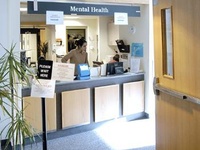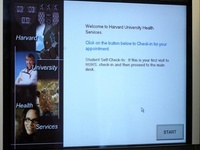In 1999, 32 percent of UHS mental health appointments were logged by non-students, according to the Provost’s Committee report. This year, Kadison estimates 25 to 30 percent of appointments were taken up by non-students, but says exact statistics are not available.
The new policy was intended to decrease the time between requests for first appointments and first appointments from five to seven days—the 1999 standard—to three to five days.
Kadison says that UHS has met this goal.
But according to a poll conducted by The Crimson, almost 30 percent of students who had been to UHS said they had to wait from one to two weeks for a first appointment. Thirty-nine percent of students who had been to UHS received their first appointment within two days of placing their first call and around 26 percent got an appointment within one week.
Regardless of the changes UHS has made to accommodate more students, Hyman says a dramatic increase in the number of students seeking therapy since 1999 has necessitated yet another look at how the system can be improved, or expanded, to meet the demand.
He and Dean of the College Benedict H. Gross ’71 formed a committee charged with that task this fall.
While UHS has implemented some of the recommendations of the 1999 committee, the use of split care and episode of care demonstrates continued emphasis on keeping costs down—an emphasis that was a primary criticism in the 1999 report.
“Perhaps the most widely expressed complaint about UHS in general and [Mental Health Services] in particular is that managed care is imposing constraints...the perception among many administrators across the Harvard community that student care is governed by the bottom line rather than quality standards is cause for concern,” the report concluded.
Four years later, Undergraduate Council President Rohit Chopra ’04, who has focused on improving mental health resources this semester, echoes the report. He says he would not call UHS “cheap,” but adds that he does think they compromise student care to be cost effective.
“UHS is an HMO,” Chopra says. “I’m sure they could [provide better care] but I assume that they want the HMO to be self-sufficient even though that might be unrealistic in a college setting.”
— Anne K. Kofol contributed to the reporting of this story. —Staff writer Katharine A. Kaplan can be reached at kkaplan@fas.harvard.edu.










